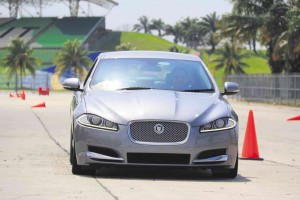Slipless in Sepang
Jaguar fearlessly chose a special venue to launch its refreshed range of sports sedans, the XF midsize and XJ full-size, and coupe, the XK: the Formula One track at Sepang, Malaysia. On hand to give participants a thorough wringing through the course were instructors from the UK and South Africa, as well as Jaguar Philippines bosses Marc and Jason Soong.
The brothers Soong joined a cadre of customer and media participants from the Philippines in sampling the capabilities of the fleet with the leaping cat logo in a high-speed, no-compromise environment. Though we all wanted to jump in the right-hand driver’s side of the growling XKR-S coupe, we first slipped behind the wheel of the XF, Jaguar’s midsize executive sedan.
The XF embodied a bold new styling direction for the marque when it debuted in 2008. It was sleek and beautifully proportioned, with fanatical attention to detail. The facelifted model borrows the wrinkled-brow look of the larger XJ, and comes with a host of new engines. We sampled the new 3.0-liter V6 diesel, not the first choice you would think for a racetrack. With 272 hp for the S model, the oil burner begged to differ. 0-100 kph zipped by in a tick over six seconds, and we nearly reached the car’s top speed of 250 kph on Sepang’s long straight.
Reduced fuel consumption
The diesel also has the benefit of reduced fuel consumption, and the rumble is hardly out of place in an executive cruiser. The tumescent rotary shifter knob, that infamously rises when the car is started, now controls an eight-speed automatic transmission. The XF also proved quite agile on the slalom course, where George Ramirez posted the best time of the day, with Jason Soong coming in just 0.2 seconds behind.
A Formula One track would seem to be ill-suited to a luxury barge, but the XJ is no ordinary sedan. For starters, it is built on an aluminum chassis, which cuts weight and improves performance. The latest generation of XJ dispatched with the legacy styling of the storied model name, which stretches back to the 1960s. The latest XJ looks space age, with its squarish grille surrounded by sinuous curves and swept-back metal, culminating in the unique LED slivers for taillights, nicknamed the cat’s claws. The XJ also displayed its claws on the track, putting down power in corners with aplomb. The power comes from an engine with surprisingly small displacement. With just 2.0 liters and four cylinders, the gasoline engine uses turbocharging to produce 238 hp. Acceleration is brisk and top speed is still in excess of 240 kph. Fuel consumption is what one might expect from a compact economy car, with correspondingly low emissions. The lightweight chassis makes such performance possible. The interior is suitably loaded to the gunwales with state-of-the-art technology, from the 20-speaker audio system to the full-length panoramic glass roof to the digital screen that acts as a virtual instrument panel.
All bite with deep bark
To put an exclamation point to the afternoon’s driving, we donned balaclava and helmet for a taxi ride in the 300 kph XKR-S coupe. With 550 hp from its 5.0-liter supercharged V8, the XKR-S is all bite with a deep bark to boot. The professional drivers showed us why helmets are necessary in a luxury coupe, as our heads were pressed firmly into the side windows during cornering. Like the XJ, the XK is also based on a lightweight aluminum chassis. The XKR-S felt at home on Sepang’s smoothly undulating surface. Its taut suspension allowed the driver to feed steering and power in a balletic display of automotive power.
We ended the day on a high note with an unexpected surprise: a sneak peek of the new F-Type (see sidebar). Maximizing a car on a Formula One track takes special ability and a special breed of vehicle. With our ability still at the novice stage, we could breathe easy that Jaguar took care of the vehicle dynamics part with its strikingly-designed pack of very fast cats.
